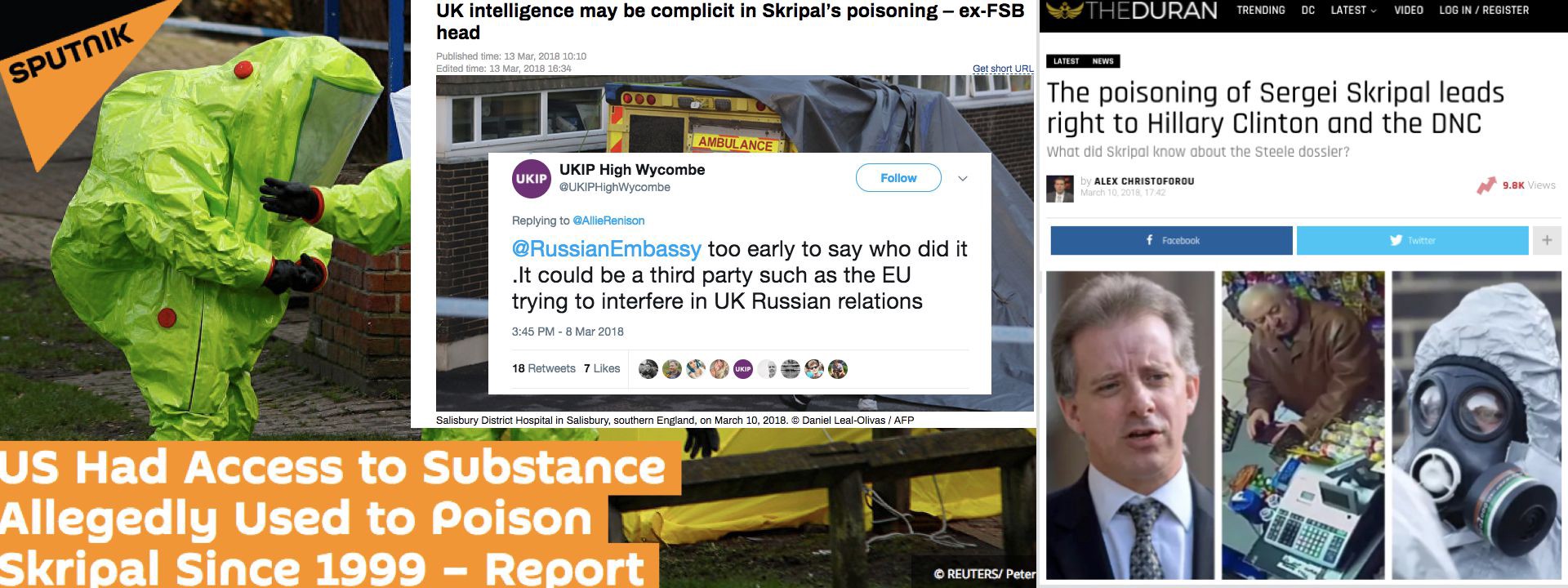
By DFRLab
Ever since the British media began suggesting that Russia was behind the poisoning of former spy Sergei Skripal with a rare nerve agent on March 4, theories have swirled over who else might have done it, especially via pro-Kremlin outlets.
The conspiracy-based speculation intensified on March 14, after British Prime Minister Theresa May confirmed that the UK government held the Russian state responsible.
Pro-Kremlin outlets have a long history of broadcasting unorthodox, and sometimes conspiratorial, theories when Russia is accused of violating international law. Here, we present some of the main theories circulating on English-language outlets, especially Russian state-owned outlets.
1. It was a British “false flag” operation
The most oft-repeated theory, especially on Russian state broadcasters RT and Sputnik, was that the Skripals’ poisoning was the work of British intelligence.
This began early. A Sputnik editorial on March 8 argued, “Given their inveterate anti-Russian agenda, the British authorities have much more vested interest in seeing Skripal poisoned than the Kremlin ever would.”
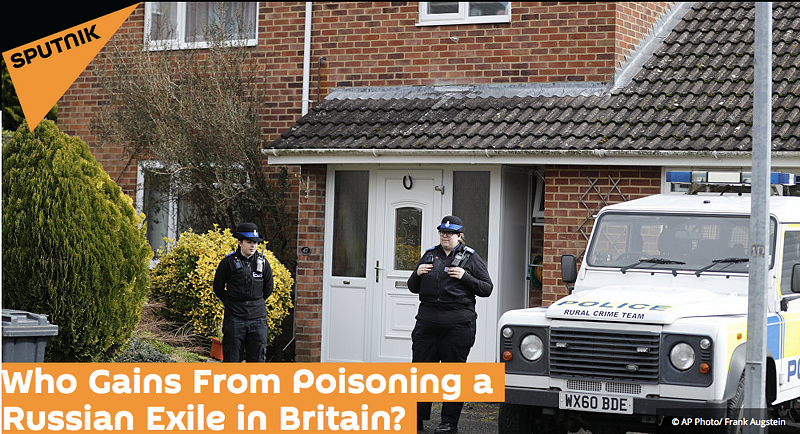
The article rationalized the theory that the British government would use a foreign nerve agent on a civilian and former informant in a crowded public place in southern England by referring to events in Russia.
“It seems highly significant that Russia’s presidential elections are due to take place later this month. What better way to smear the expected electoral victory of incumbent president Vladimir Putin than to accuse the Kremlin of carrying out an assassination plot on British soil against a former Russian spy?”
The same Sputnik author repeated his theory on March 13. He wrote, “What’s much more plausible is that the British authorities staged the event as a propaganda stunt to frame and further demonize Russia.”
The same day, Sputnik interviewed a number of “analysts” under the headline, “Russia ex-spy’s poisoning seems like plot to derail UK-Russia ties — analysts.”
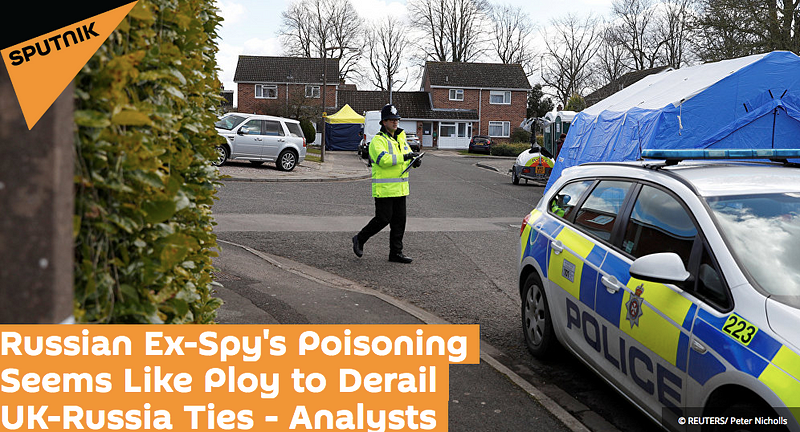
According to one of those analysts, Helga Zepp-Larouche, the attempted murder could be a “dirty trick” created by UK intelligence “as a pretext for another anti-Russia escalation.”
It is to be questioned whether Zepp-Larouche is an authoritative analyst of British government intelligence practices, however. One of her earlier writings was titled, “Defend mankind from the satanic climate-change swindle,” and argued that anthropogenic climate change is a “swindle” aimed at establishing “a fascist world government which would exceed Hitler’s most audacious dreams.”
Other pundits interviewed for the article included two representatives of the UK Independence Party (UKIP), which has a pattern of pro-Kremlin voting in the European Parliament, and the leader of the fringe UK Christian Peoples Alliance. The final analyst was Swedish-based Professor Marcello Ferrada de Noli, best known for accusing the Syrian White Helmets rescue group of staging video footage of their response to a chemical attack in March 2015.
The analytical qualifications of the bulk of these “analysts” therefore seem open to question.
The same day, RT reported an interview with the former head of Russia’s FSB intelligence service, Nikolay Kovalev. The interview was given to Sputnik’s sister agency, RIA Novosti.
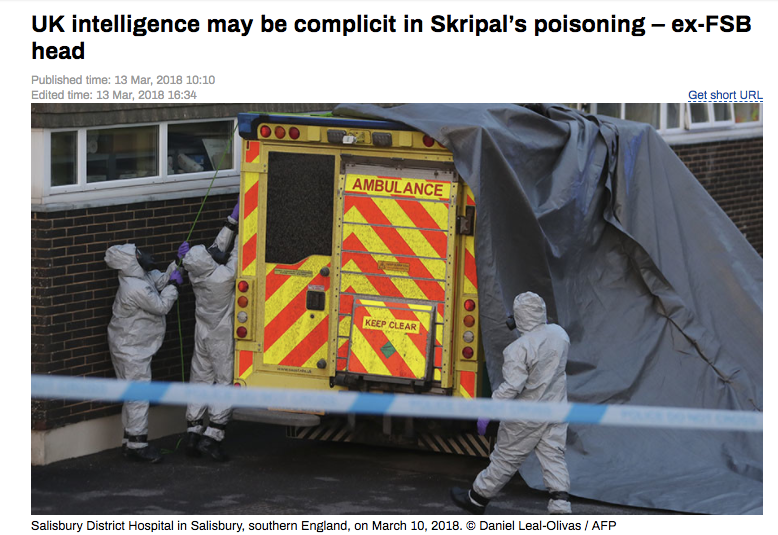
As quoted by RT, Kovalev said, “It looks like British secret services are complicit in it. [Defectors] are fully under surveillance … the secret services are monitoring them, they know their whereabouts and schedules.”
In the same post, RT also quoted another RIA Novosti interviewee, former FSB general Vladimir Mikhailov, who said that MI6 “could have synthesized the agent and use it for political purposes.”
Another RT article quoted yet another former FSB head, Sergei Stepashin, who said, “a primitive provocation by British intelligence services.”
This theory fits the Russian disinformation model of “dismiss, distort, distract, dismay.” It is best seen as an attempt to distract attention from the British government’s extraordinarily severe accusation against Russia.
2. It could be the CIA
Both RT and Sputnik also broadcast the claim that the United States had access to the Novichok family of nerve agents — basing their news coverage on a New York Times article written in 1999.
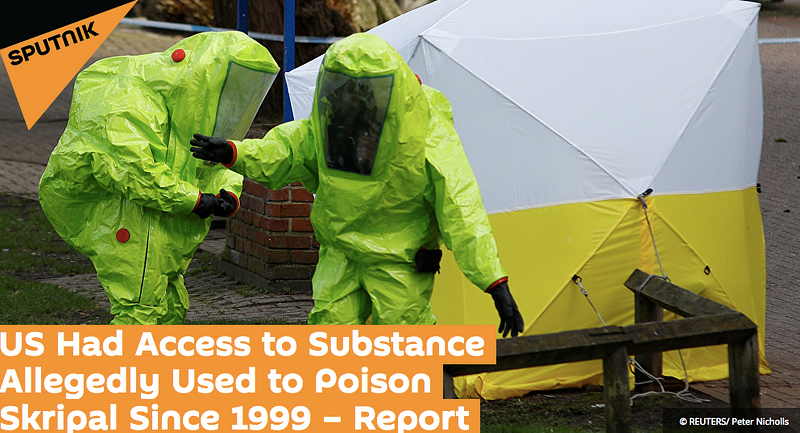
RT referenced the report briefly in a larger article detailing various reasons why Russia might not be behind the poisoning. Sputnik provided a standalone article, largely quoting from the New York Times.
Neither outlet stated outright that the United States may have played a role in the poisoning. That was left to the Director of the Institute of Political Studies in Moscow, Sergei Markov, who connected the dots in an interview with Al Jazeera:
“Novichok had been produced in Uzbekistan in the Soviet times and after the fall of the Soviet Union, as we know, the American intelligence services had access to this factory. The American and British intelligence services have a very strong cooperation with each other, and I am sure 100 percent that the British got this Novichok nerve agent from them for this provocation.”
The same argument was taken up by sites on the conspiracy-theory fringe of the English-language media space, especially sites which support United States President Donald Trump.
Far-right blog “The Ethnic European”, which proclaims its principles as “Race — Nation — Culture — Heritage — Tradition — Family,” posted a long article headlined “The assassination nation,” which reviewed a history of alleged assassinations in Britain, Europe and, especially, the United States:
“In the US more than 40 forty high profile Western bankers have died under suspicious circumstances. The European Union records more assassinations than does Russia; is the EU trying to catch up with the US perhaps?”
Another article by the same outlet on March 11 indirectly quoted an analyst named Tom Secker, who said that there were “many victims of the British agent who had a motive for his attempted murder. Skripal betrayed many people, not just in terms of agents but criminal organizations too.”
This appeared to be based on a Sputnik interview with Secker on March 9, in which he said, “He betrayed quite a lot of people, and not just in terms of governments, not just in terms of government agents or intelligence agencies, but potentially private criminal organizations.”
3. Because of Donald Trump
U.S.-focused users were particularly excited by the theory that Skripal’s poisoning may have been connected to the controversy surrounding Trump’s Russian connections.
The theory, which surfaced within hours of the discovery of the Skripals, argued that the Russian former agent could have been a contact of former British agent Christopher Steele. Steele, in turn, was the author of a notorious dossier alleging corrupt links between Trump and Russia — the subject of bitter partisan fighting in the U.S.
The theory was debated on both sides of the hyper-partisan divide. As early as March 6, Trump opponent and online commentator Ed Krassenstein posted on the story, saying, “It is expected that Putin may have had him poisoned.”
Sergei Skripal, a Russian double-agent was found unconscious and ill in the UK, along with his daughter.
Skripal has done work with Christopher Steele and it is expected that Putin may have had him poisoned.
— Ed Krassenstein 💎 (@EdKrassen) 6 марта 2018 г.
The following day, the Daily Telegraph alleged that Skripal had become close to a consultant who worked alongside Steele.
The story was quickly picked up by Trump supporters, who argued that Skripal was more likely to have been targeted by British or American intelligence — both portrayed as part of a “deep state” conspiracy against Trump.
Conservative partisan site the Gateway Pundit, for example, headlined, “Who Poisoned Russian Agent Sergei Skripal? Who Had the Most Reason to Off Him? …Was it Russia or Deep State?” The article repeatedly accused an alleged “deep state” in the U.S. of involvement:
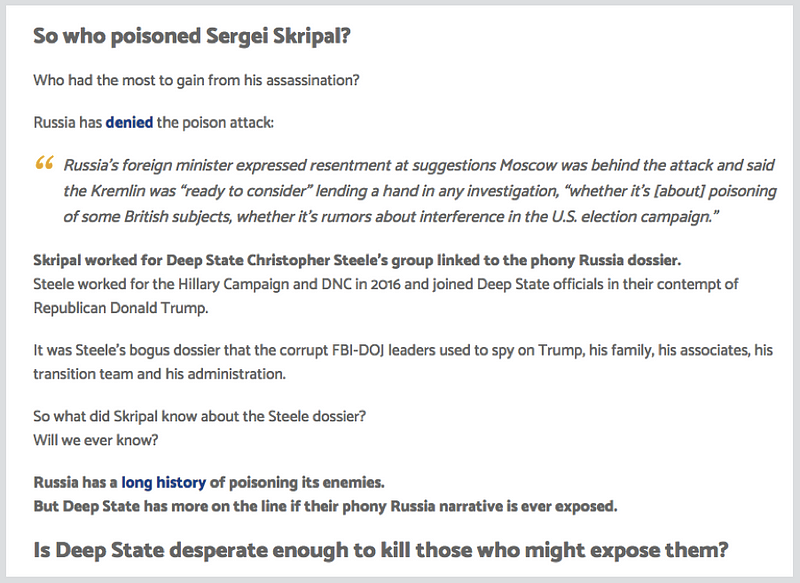
Website moonofalabama.org wrote, “More likely is an involvement of Skripal in the Steele dossier and the CIA/MI6 operation against Donald Trump. Was he assailed because he threatened to talk about it?”
Pro-Kremlin propaganda site The Duran also devoted an entire article to the thesis, headlined, “The poisoning of Sergei Skripal leads straight to Hillary Clinton and the DNC,” referring to the Democratic National Committee. It asked, “Was Skripal the latest victim of the Clinton mafia’s murder machine?”
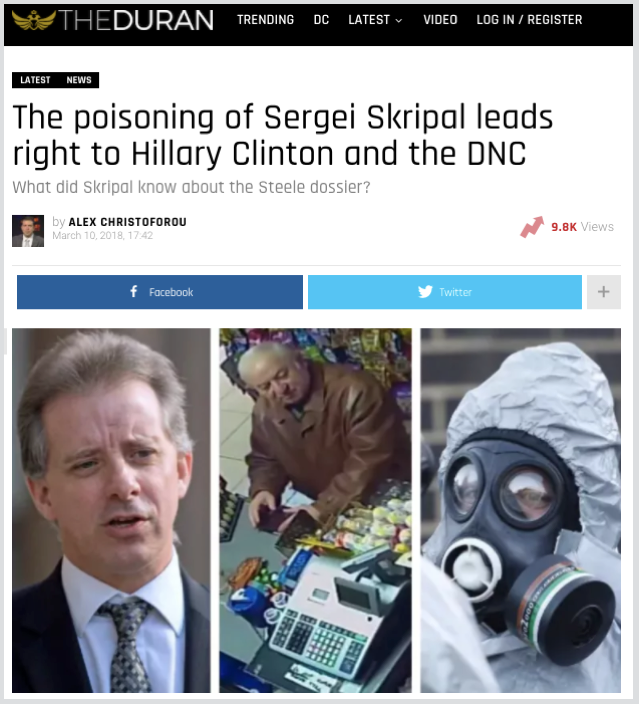
The consonance between pro-Kremlin, pro-Trump, and anti-Clinton was especially visible here. It need not imply coordination, but underlines once more the narrative convergence between the two groups.
4. There’s always Ukraine
Those who followed the accusations and counter-accusations which followed the shooting down of Malayasian Airlines flight MH17 will be aware of the range of ways in which the Kremlin sought to blame Ukraine. An international investigation found in 2016 that the fatal missile had been brought into Ukraine from Russia.
A few Russian commentators appear to have revived the narrative to cover the Skripals’ poisoning, although it is unclear how seriously they meant it.
Former FSB director Kovalev, for example, aired the theory that the nerve agent could have been stockpiled in Ukraine, and used by the Ukrainian state, in his RIA Novosti interview:
“Given that [such substances] were stockpiled in former Soviet Union republics — sorry, but Ukrainian involvement can’t be ruled out.”
Researcher Julia Davis highlighted a moment on Russian state TV in which Ukraine was singled out for blame.
#Russia‘s state TV presents #Skripal poisoning conspiracy theory No. 9:
“Ukraine did it to frame Russia.”
(It’s so ridiculous that the host and panelists can’t keep a straight face and burst out laughing.) pic.twitter.com/cuGgVK3HA4— Julia Davis (@JuliaDavisNews) 14 марта 2018 г.
Davis kindly shared the exact timestamp of the video with @DFRLab, allowing us to confirm the comment, “I don’t want to point the blame at Ukraine, but…” and a subsequent discussion of why Ukraine might be guilty.
This also allowed us to screengrab the faces of the other panelists, showing their disbelief. One then commented ironically, “The fascists in Kiev, of course!”, indicating that this conspiracy theory is unlikely to gain traction even in Russia.

Davis also underlined a number of other theories pushed by the Russian-language media in a Twitter thread, including accusing the UK, U.S., an accidental overdose, and suicide. The latter do not appear to have made it into the English-language space, at least as yet.
5. And finally…
The conspiracy theories did not stop here. Multiple special-interest groups have attempted to lay the blame for the Skripals’ poisoning at the door of their chosen enemies.
A UKIP branch in High Wycombe, in the English Home Counties, tweeted to accuse “a third party such as the EU” of “trying to interfere in UK Russian relations.”
Moscow better hope that Skripal and his daughter and the *police officer* who found them who’s also fighting for his life pull through
— Allie Renison (@AllieRenison) 7 марта 2018 г.
According to David Leask, chief reporter at The Herald newspaper in Scotland, one apparently Scottish user on The Herald’s website accused England, on the tortuous logic that such a move would allow the British government to criticize former Scottish nationalist leader Alex Salmond for hosting an RT show.
Not necessarily from the Kremlin, but there is “The English done it to smear Alex Salmond” is an theory on the fringes of Scottish cyberspace. pic.twitter.com/taWw3wtbeB
— David Leask (@LeaskyHT) 14 марта 2018 г.
Sputnik even misquoted former Kremlin advisor Alexander Nekrassov as accusing “rouge agents” [sic] of carrying out the attack, “for some sort agenda [sic] such as slander or tarnish Russia [sic] or cause friction between Britain and Russia.”

Given Sputnik’s editorial standards, it is fair to assume that Nekrassov was talking of “rogue” agents, rather than agents in heavy makeup.
Given the range of conspiracy theories swirling around the attack, however, even this may not be certain.
@DFRLab will continue to monitor developments with regard to the Skripal poisoning, subsequent developments between nations, and narratives from all sides of the conversation.
By DFRLab
Ben Nimmo is Senior Fellow for Information Defense at the Atlantic Council’s Digital Forensic Research Lab (@DFRLab).




